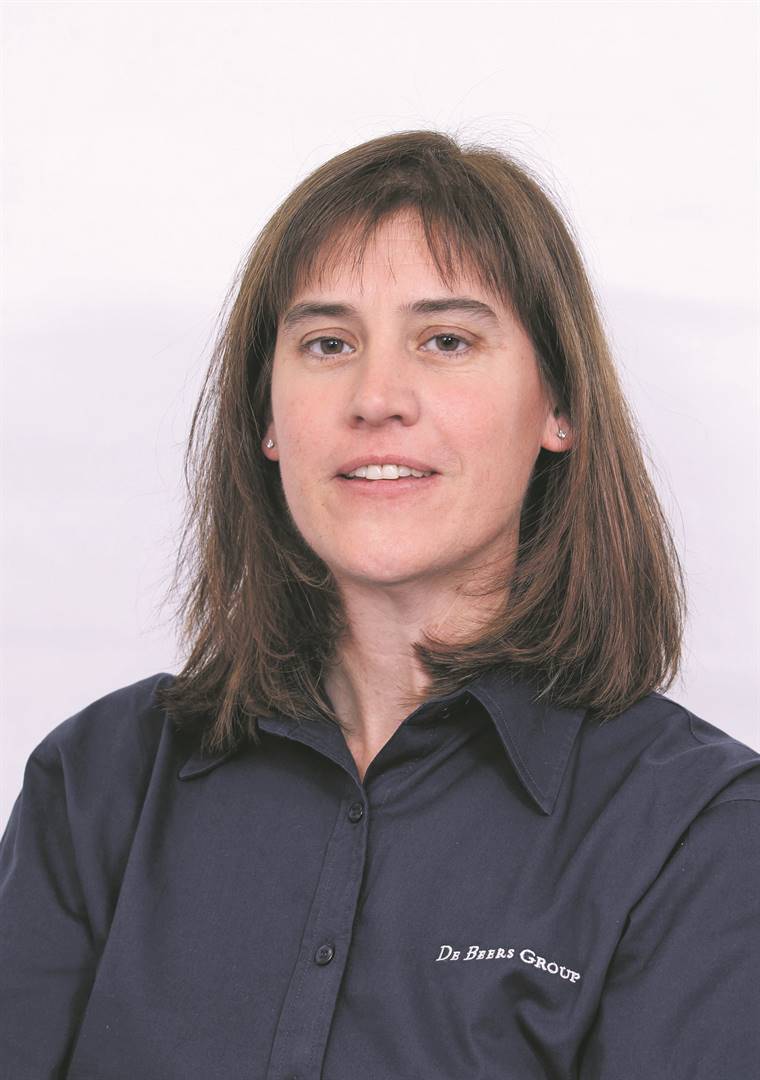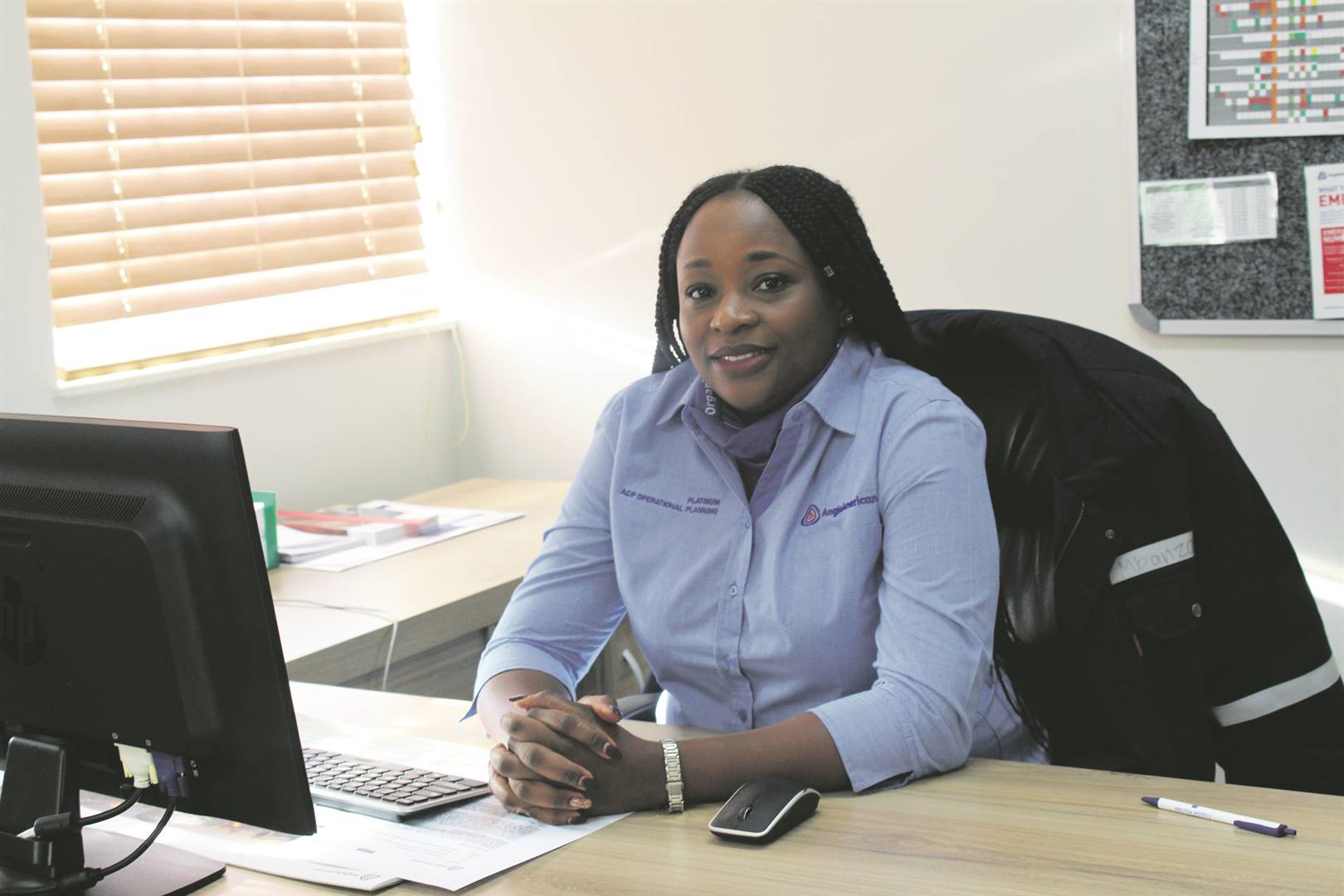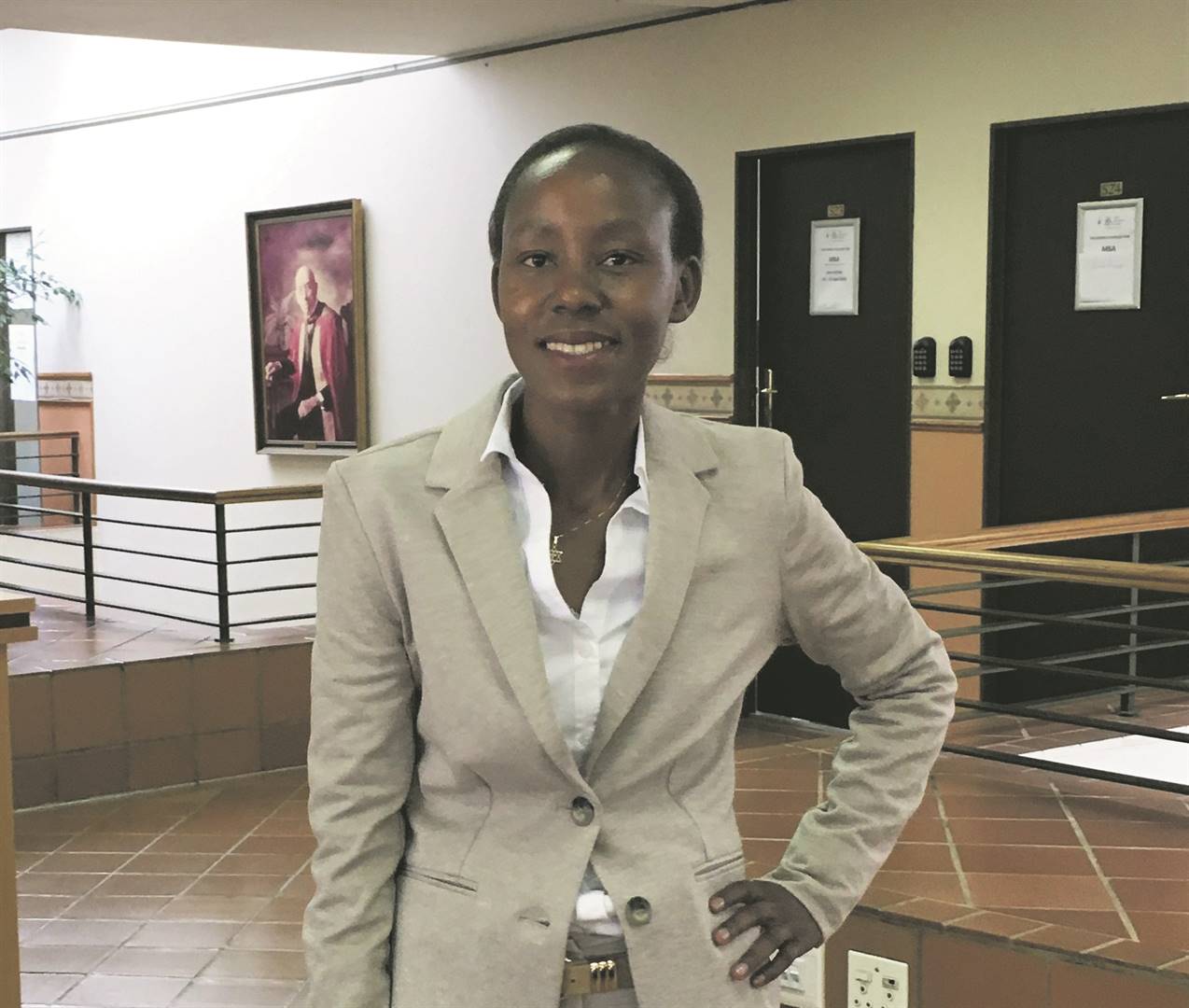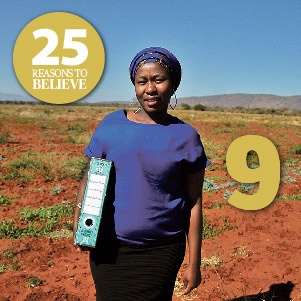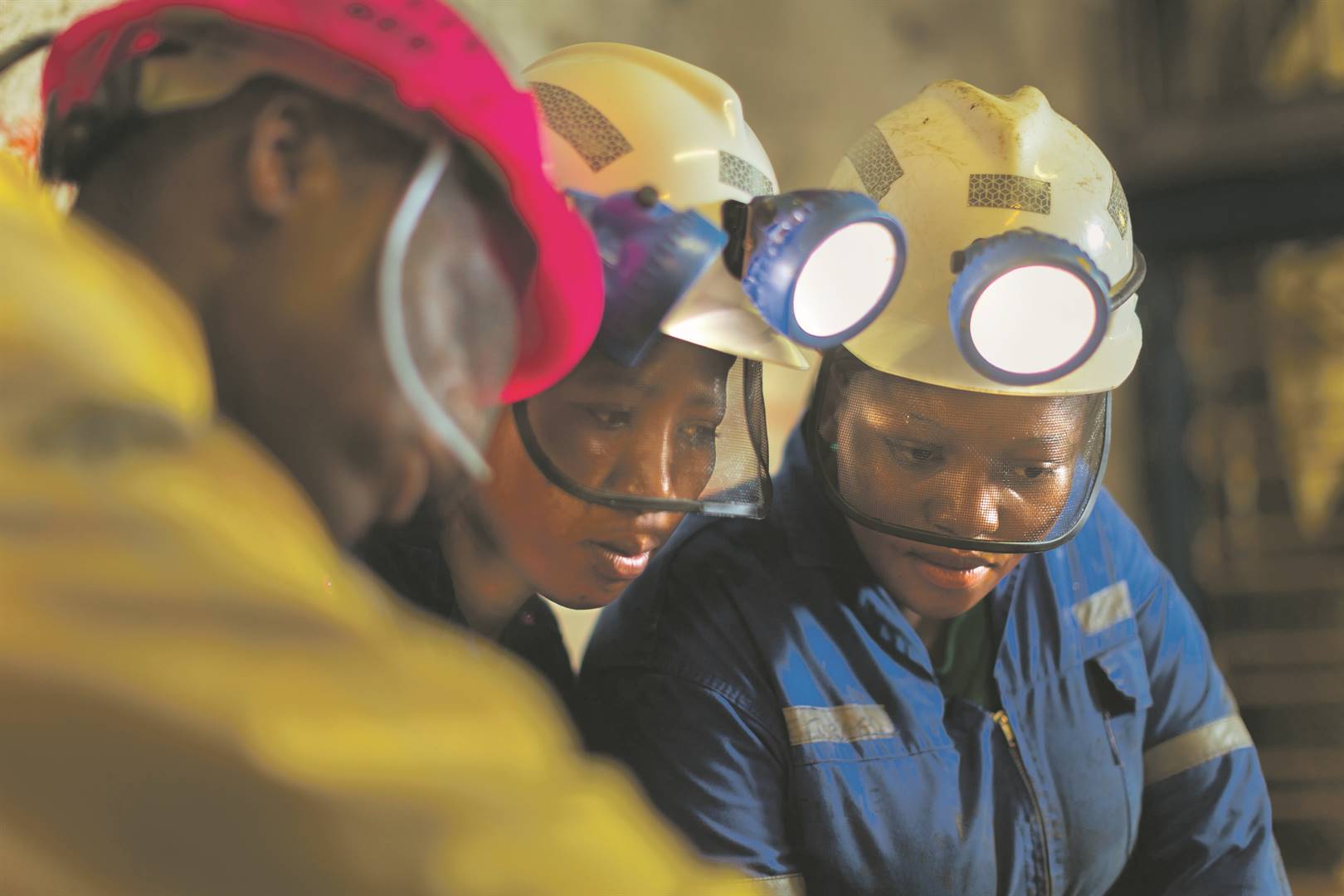
As South Africa celebrates a generation of freedom, Anglo American acknowledges its deep roots in the country and looks ahead to its contribution in the next 25 years and beyond. Over the next five weeks experience 25 Reasons to Believe with City Press as we explore the economy, job creation, enterprise development, health, land reform, sustainability, technology and – most important of all – communities.
Many people believe mining is unsuitable for women. Anglo American's Inclusion and Diversity Strategy is changing this mind-set, writes Rhode Marshall.
Portia Malele - Kumba Iron Ore: Drill and Blast Manager
While her peers were swayed by mainstream careers such as accounting, teaching and medicine, Anglo American’s iron ore business, Kumba Iron Ore’s Sishen mine’s Drill and Blast Manager Portia Malele knew she was destined to break boundaries in whichever field she chose. And so she went onto study mining engineering at the University of Johannesburg and now leads one of the largest open-pit mining operations on the continent.
Malele also successfully completed the BHP Billiton Graduate programme in 2007, attained a Mine Managers Certificate of Competency (Coal) in 2009, and is currently studying toward attaining a Post-Graduate Diploma: Business Management and Administration.
The 32-year-old has spent the past six years as a manager at Sasol’s Twistdraai coal mine in Mpumalanga, where she played a key role in extending the life-of-mine of the East Shaft by 18 months, and won the Sasol Mining Super League award for the best shaft at Thubelisha South Shaft in August 2017 and November 2018.
“Growing up I grew up in a family that was very supportive of expressing yourself and doing what is it that you wanted to do but quite lucky. In fact, they were quite supportive of me doing things out of traditional expectations of what girls should do. They encouraged us and taught us that you can do anything that you want to do in life and never confine yourself,” Malele says.
She works hard to produce the best line of productivity and meeting targets with a dedicated obsession for safety. Malele boasts that she has recorded more than 11 injury-free months at Thubelisha South Shaft before moving to Sishen.
“You have to be highly skilled to manage both the equipment and the safety of people and the community at large. At Anglo American and Kumba, safety is the absolute priority in everything we do. It’s important that I ensure we entrench and maintain safety at all times. That way, we can excel within our performance and meeting our objectives,” she says.
A major focus for her in her new role at Kumba Iron Ore will be to drive the Tswelopele initiative, which means building Kumba’s transformation journey to its full potential and beyond. And while she’s excited about the new opportunities and technologies that comes with Tswelelopele as well as Anglo American’s vision of ‘Re-imagining Mining’, she is passionately driven by and for the people of Sishen.
“It’s exciting for me to interact with people. I motivate my team every day and make them aware that we are really the heart of the operation, especially now that we’ve got new technologies.”
Practising what she preaches, she is fighting hard to open the door for other women and believes that the industry can attract more women. “I want to give young people, especially women, opportunities in the mining industry. I want to nurture and support more female leadership and help to empower others wherever possible. That’s the real difference,” she says.
Malele is also impressively the former chair of the Women-In-Mining Forum at Sasol Mining, and the chair of the Mpumalanga tripartite task-team that successfully led the advancement of women in mining and she continues to tirelessly work to help continue the transformation of the mining industry, and creating mining as a viable career option in the minds of young women.
Francette Jacobs - Business Improvement Manager at Anglo American’s diamond business, De Beers Group
There are wide ranges of opportunities that exist in the mining industry. Not all jobs require a dive to the deep underground or selecting one of the more strenuous roles, which speaks to why women aren’t being chosen or choosing careers in mining themselves.
Francette Jacobs, the Business Improvement Manager at De Beers Group is one of those women who was determined to find her place in an environment that wasn’t perceived to be welcoming to her gender.
She learnt and explored throughout De Beers until she found her niche, which brings her the career, and life satisfaction she believes only mines could have provided her with. “I’ve had quite an interesting run in the company,” she says while impressively laughs at the different roles she has been fortunate to explore.
Back in the 90s, Jacobs was a De Beers bursary recipient and went onto study Chemical Engineering at the University of Stellenbosch. From there she worked her way up from starting as a Mineral Processing Engineer at Venetia Mines, even trying her hand as a security manager at the same mine to now serving as a Business Improvement Manager.
“I would like to hope that we would be able to build an industry that is both safe and profitable. Mining has a very negative connotation attached to it when it comes to safety and profitability. So because it’s such a key component of the economy, we have to start leveraging of some of the new innovations that’s available to us, especially technology. The right use of technology can improve both our safety and our profitability.”
She explains that one such good development and innovation in the industry is the automation that’s now available to for underground mines.
“Venetia Mine is currently looking at going underground, so for us looking at automation and automated mining activity, is one of the key things that we’re focusing on just because of that impact on safety. That means we’re able to remotely control equipment and don’t have to have people in dangerous areas.”
This was required for the industry to remain viable despite escalating costs and falling commodity prices amidst ageing infrastructure and the innate difficulties of deep-level mining.
“Ultimately, we want to see that the communities are benefiting, the employees are benefiting and that our stakeholders are benefiting. Mostly I would also like to see a mining future where we can provide more equal opportunities and allow everyone the opportunities to really excel at the work that they have been qualified to do.”
Jacobs believes that for women to meaningfully participate and contribute to the industry, there needs to be robust change – which she credits Anglo and De Beers aggressively being part of.
“The future is bright for women. Women are more empowered now to be anything that they want you to be. When I was in high school, I really wanted to become a geologist. But at that point in my life, my mother actually said to me that you can’t do geology, it’s a man’s job. It was quite strange that ended up in engineering afterwards. But now I think there’s a much greater awareness out there that women can become anything they want to be.”
“On the management side, there’s much more awareness. At De Beers we’re very aware of that. Just the growth of a woman in the top roles have already been increasing in terms of numbers. Our ratio of women in mining and the women in senior management roles are quite good. So I Do you think that the future is quite bright for women.”
Mbanza Sichone - Metallurgical Production Engineer at Anglo American Platinum
South Africa, a country rich with mineral endowments continues to be a world leader where its mining exploration remains a catalyst for future economic growth and business opportunities.
When women take up a space, it goes beyond being great at their jobs. It’s about inspiring more women to join, creating innovative opportunities for the next generation based on their own perseverance in the face of adversity, while being trailblazers in the industry - all while being a voice and role model for diversity and inclusion.
“What I’ve tried to do since I’m in a much more senior role, is that I mentor, a lot of young ladies, I think I’ve got eight at the moment. I tried to show them without always telling them how you can be in charged and teach them without having to say I’m the manager how to carry themselves with confidence. Confidence is in many forms, it’s the voice you use to articulate, it’s where you choose to sit in a boardroom - we want to sit on the peripherals as women and wait to be told to join the meeting. But you learn to just take the authority because you have to. So I’ve tried to show and in my actions rather than just tell them that that’s how I’ve tried to make it easier for my fellow women. And I do find myself being informally asked to coach quite a few of them. Some I haven’t even met yet, because in other operations and they told but if you want someone to speak to call Mbanza and she will help you out. So I hope I’m doing enough.”
Zambian, Mbanza Sichone, did her Bachelors in Chemical Engineering at the University of Birmingham in the United Kingdom through bursary opportunities created by mines in her native country, which she returned to and worked for the copper mines for seven years. That’s until a prospect presented itself in 2008 for her to relocate to South Africa.
“Both my parents worked for the mines, my father part of the engineering team and my mother a nurse at the mine hospital. So I spent most of my life living in a mining town.”
“Usually as women they would direct us to careers in medicine or law, so there were these unwritten inferences that you sort of want to push women to what was may be deemed more roles where they can function as women. So mining was actually me going against the grain. It was a conversation I had with my, my uncle, actually, my father’s younger brother, because he said, Why don’t you try something that not everyone’s doing? And that’s where I sort of applied. I did get the scholarship and I suppose here I am today.”
The charismatic Sichone who is a Metallurgical Production Engineer at Anglo American Platinum says one of her greatest rewards in her role, and particularly being a woman working in a space where some believe she doesn’t belong, is that she gets to show her male colleagues the prospects for their own daughters.
“When you come as a leader in the mining industry, you get those who are absolutely intrigued and almost fascinated that a young black woman can actually do this function that has always been occupied by men. And it inspires them, because that means their daughter can do this too.”
The reality of this industry is that few women bother to explore career opportunities in mining or are encouraged to – this is where mentorship can play a great role Sichone says, as greater strides needs to be taken to attract the skills of women to the mining sector as technology becomes a greater asset.
“If I look at how far we’ve come - and this is now my 17th. year in industry - when I came to South Africa, in 2008, there were a few women, but in finance, or one or two dotted in production. So here, what I found is maybe in the management level, so where you operate as an engineer, I was in meetings very often the only female. But if I fast forward to 2019, in our team, we are the only one there’s four or five others we’re like 30%. There has been a significant shift in the representation of women in mining, and not in what was stereotypically reserved for women. But now you see us actually running a mine or doing the engineering functions. So it’s moving, it may be slow, but it’s moving.”
Lebogang Mphasha – Anglo American: General Manager, Mineral Resources Data Systems
Having a career with longevity goes beyond just being great at your job. When you work in an environment where you’re the exception, inspiring others and showing perseverance comes with the territory – things that Lebogang Mphasha believes one must do.
Mphasha started her journey at Wits University where she studied mining engineering after receiving a bursary from Anglo American, and has been growing her career within the company since 2006. Now she is general manager in Mineral Resources Data Systems.
“When I was at school I wanted to become a doctor. One day, while I was in matric during workshops that Anglo American held for students to upgrade their maths and science, someone presented mining engineering as a great option for women who were looking for a career where they would be pioneering roles.”
Up until the 1990s, women were not permitted to work underground in South Africa. But this changed when the South African Mining Charter introduced quotas urging mining companies to employ a 10% female staff complement.
“What attracted me was an industry which was untapped by females, and it was an opportunity to try something that hadn’t really been tried.”
Although the mining companies themselves are now working hard to be inclusive and transform, it is still taking time for more women to enter the industry and be retained until they reach executive levels – but Mphasha is excited about the possibilities and growth.
“There were a lot of roles where I was the first woman to join a crew and they didn’t believe that a woman belonged in that role. But we have grown past that – so much so that we’re getting past the phase of making those gender distinctions.”
Mphasha says opening up an environment for women in this field - like her – starts by giving scholarships and bursaries. “Mentorship is very important too. It results in better success rates in their career path particularly in the technical roles as well as in leadership.”
“If I look at the work that has been done to incorporate women in the industry, then I don’t think that the presence of women would be an issue. If we continue to make strides as an industry by placing more women in senior positions, then we can move onto focusing where we are and where we should be headed to enable the industry to survive, and that is increased inclusion of artificial intelligence and robotics.”




 Publications
Publications
 Partners
Partners





